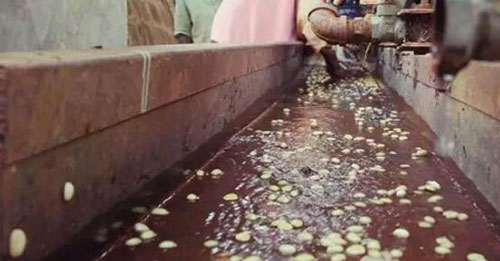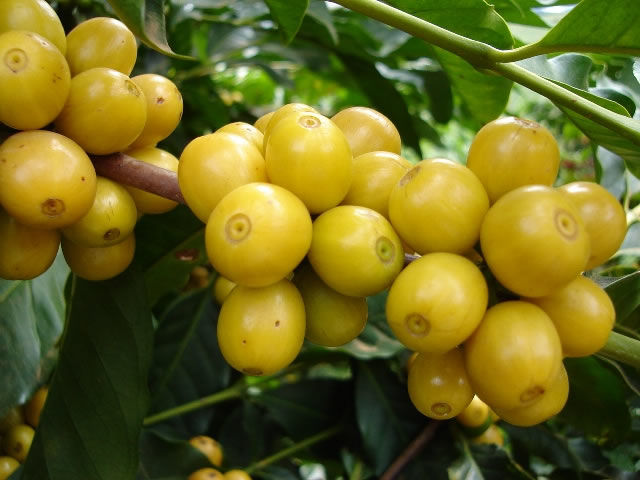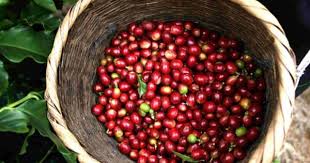Ethiopia Red Cherry Project Xie Like Shilcho Cooperative G1 washed coffee beans Details
For professional baristas, please follow the coffee workshop (Wechat official account qianjiecoffee)

Ethiopia is the country where coffee was first discovered, and it is still the most important producing country and the best in terms of coffee quality and output. Coffee is mostly traditional Arabica species, with an annual output of about 350000 tons and more than 70% of which are exported to countries around the world. About 15 million people in the country are engaged in coffee-related industries, and more than 90% of the farms or cooperatives are planted in small areas. Crops produced in Ethiopia after 2008, including wheat, corn, sesame coffee, etc., were fully introduced into the ECX trading system (Ethiopian Commodity Exchange) to replace the existing auction and export methods, by coffee farmers or cooperatives, sending coffee to ECX centralized warehouses, beans of the same grade and producing areas will be mixed together and auctioned directly. You will not know which farmers or cooperative producing areas produce it. In fact, this practice has no effect on output and quality, and it is easier to tell the quality of coffee by price. What is triggered is that intermediate traders cannot freely track their satisfactory profits [low price and high quality] so that consumers will know more clearly, because they will be taxed heavily if they do not pass the ECX trading system. Now more than 90% are through this trading system, but for buyers of boutique coffee ECX trading system is not a good thing, so from 2010 Ethiopia launched the DST (Direct Specialty Trade) system, DST system is an irregular Ethiopian auction, only through the SCAA cup test standard of more than 80 points of boutique coffee specialty coffee can hang up their own farm or cooperative name with foreign raw bean traders trade.
Schilcho
Temporary women workers use their eyes to pick out coffee beans
Washing beans in Ethiopia will be distinguished by adding 1 and 2 after the name (with a higher quality of 1). The pulp is removed immediately after the coffee cherry is harvested, and then the coffee bean is fermented in water to remove the pectin layer. this process takes several hours, and the number of hours depends on the type of coffee, producing area and temperature. This process must be closely understood that if there is a slight mistake, the coffee bean will have a poor flavor, and after fermentation is completed. The coffee beans will be washed through a long sink with a high and low drop, and any defective beans and foreign bodies will also be removed during the process. after that, the coffee beans will be dried on the drying bed, and it is also necessary to pay close attention to turning them every few hours to ensure the integrity of the drying process. This is the whole process of washing beans.

Operation Cherrie Red's "Red Cherry Initiative" (ORC) is a project to improve the quality of small-scale farms, mainly to encourage soybean farmers and surprise roasters. Trabocca, the largest coffee bean manufacturer in the Netherlands, invited all Ethiopian farms to produce small batches of beans of about 1500-3000 kg (25,050 bags) before the harvest season. Women can only choose fully 100% ripe red cherries, which varies greatly in flavor. So Ethiopian women who are careful and willing to work hard are important drivers of the Red Cherry project.
Operation Red Cherry is also a reinforcing method, which makes the farm pay more attention to the process of selecting beans. The prices of these coffees are also relatively high. Red Cherry Action has water washing, sun-drying beans, half-washing, half-sun, experimental coffee and so on. The main producing areas are Yegashev, Sidamo, Penga Forest, Lekanti, Ken Bata, Iruba, Hara, Lim, and joined Coroja Golocha in 2011 (near Hara). These are unique flavors and can fully show the flavor of Ethiopian beans. Trabocca will choose from the coffee after receiving it. Farms that have passed the cup test quality test in Ethiopia and the Netherlands will pay a high bonus. The cup test pass score must be more than 88 points in order to become a good coffee for the Red Cherry Project. Trabocca, the promoter of the Red Cherry project, invested all the profits earned in the past few years in the cooperative farm. Trabocca stressed that this is an unprofitable plan, so the company only uses four people, including the boss and secretary, to carry out the Red Cherry project, and other administrative related matters are supported by the parent company to reduce administrative expenses, and all the profits are returned to the cooperative farm.
Yirgacheffe Yegashev in the indigenous language is "Let's settle down in this wetland." he is located in the northwest highlands of Sidamo Province. Because there are many special representative farms and are very representative, the Xie Like Cooperative is composed of three local African indigenous peoples. The traditional bean drying process requires more control and the warmth of the sun in order to achieve good beans throughout the year. However, the cup test scores in the past can not be used as a reference for this year's purchase. Changes in climate conditions in small areas determine this year's harvest, because coffee beans are traditionally wild, and women pick them up in the forest. This is the king of good coffee. If you want to omit this process, you will not get good coffee.

Property Characteristics: farm characteristics
Name name: Adem Chilcho Xie Like Cooperative
Region producing area: Sidamo region, near the town of Dilla
Country countries: Ethiopia Ethiopia
Grade level: G1
Altitude: over 1800 to 2200m
Harvest period harvest time: October every year to January of the following year
Certification certification: all coffee without certification is non-toxic and organic.
Soil Type soil properties: PH5.2~6.2 red brown laterite
Coffee Characteristics: coffee characteristics
Variety variety: heirloom cultivars traditional native species of Yega
Processing System treatment: Washed washed beans
Appearance appearance: Longberry long rice-shaped 16-18-mesh
Important Notice :
前街咖啡 FrontStreet Coffee has moved to new addredd:
FrontStreet Coffee Address: 315,Donghua East Road,GuangZhou
Tel:020 38364473
- Prev

Starbucks "Star Tea" is off the shelves! It's time to talk about Starbucks' frustrated tea business.
Professional baristas follow the Coffee Workshop (official Wechat account cafe_style) in recent weeks, partners in the United States have noticed that Peach Green Tea Lemonade on the Starbucks drink list has disappeared without warning. Confirmed by Business Insider, Starbucks has made peaches and mangoes, the most important raw materials for peach, green tea, lemon tea.
- Next

[design appreciation] filled with Mediterranean-style elegant and romantic Melbourne Cafe
Professional baristas Please follow the Coffee Workshop (official Wechat account cafe_style) there is a quiet and quiet cafe "No19 Cafe" in Ascot Vale, which is only a short drive from Melbourne. The store was designed by architectural studio Biasol, and the designer hopes that this cafe with a strong style of Greek deli in the 1950s and Mediterranean flavor will become a highlight.
Related
- What documents do you need to go through to open a coffee shop? coffee shop coffee shop certificate processing process
- How to purchase Coffee beans in small Cafe how to choose a suitable supplier for domestic Coffee supply Company
- How to drink Starbucks Fragrance White Coffee? how to make Australian White Coffee? what Italian coffee beans are recommended?
- The Story of Flora Coffee: the name of Flora Coffee Bean and the implication of the Flowers on Florna Coffee
- How much does a cup of coffee cost? How much is the profit of a cup of coffee? What is the profit of the coffee shop in a year?
- Yunnan small Coffee, known as "fragrant Coffee", introduces the characteristics of Alpine Arabica Coffee producing areas in Yunnan, China
- 2023 latest Starbucks full menu price list how much is a cup of Starbucks coffee what is better to drink the most popular hot and cold drinks recommended
- Starbucks different kinds of Coffee Price list Starbucks menu 2023 Top Ten Best drinks in Starbucks
- Starbucks Spring praise Comprehensive matching Coffee Bean theme Story Packaging implication and taste description
- The cost of a cup of coffee latte American coffee cost price and selling price

